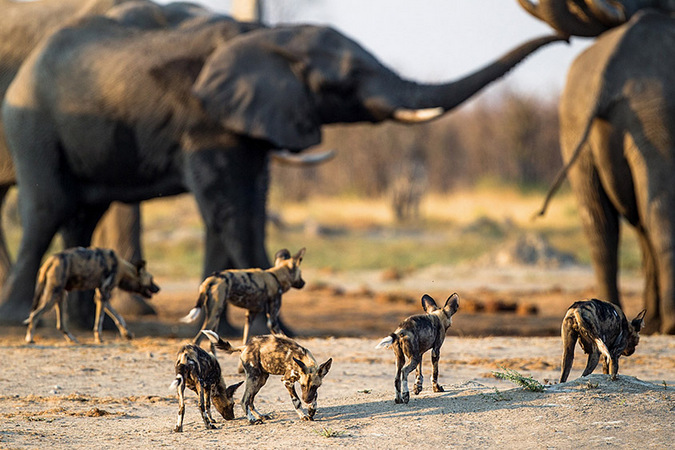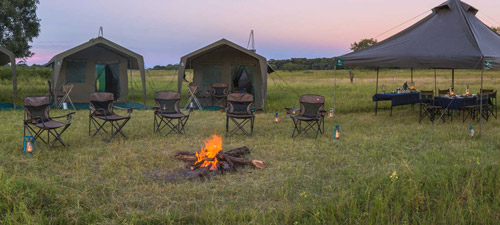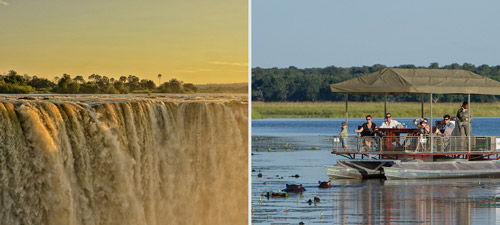
The price you pay for your safari lodge is primarily determined by when you travel, and so with a bit of flexibility as to the timing of your holidays, you can slash big chunks off your accommodation cost.
It helps to understand what it means to go on safari outside of the usual tourism seasons, and so we have prepared an explanation of the when and what of the safari seasons.
The HIGH / PEAK season – June to October
This is when most people take long leave (the northern hemisphere summer break), and go on safari.
The rules of supply and demand kick in, and lodges are priced at their peak – AND you will find that popular areas such as Botswana and South Africa’s Greater Kruger become fully booked during this period, far in advance. Some publicly accessible wildlife areas can be congested during this period, whereas lodges with exclusive traverse areas don’t suffer from this problem.
These are the dry and dusty months, when there is less vegetation to hinder your view and when animals congregate near water sources and are therefore easier to find. You are likely to see more wildlife during this period and have a higher chance of seeing predators in action.

The SHOULDER seasons – November/December & April/May
This is when most international travellers have gone home, and the local and regional travellers are left to enjoy the show.
Lodges drop their prices, and the crowds evaporate – an excellent time to travel!
November/December is a great time for safari because the height of the dry season has broken and the first brief rains bring change to the landscapes, as grass and buds start popping up everywhere. Cute babies start dropping all over the place, and resident predators have a field day. Migratory animals start dispersing after the first rains, but resident populations of most species keep the show on the road.
Migratory birds arrive, and most birds get stuck into breeding and are therefore more vocal and visible. Flying termites emerge and are preyed on by many species, from eagles and snakes to frogs and even leopards. Temperatures are more bearable than in September/October, and the usually infrequent rain clears the smoke and dust from the air.
In April/May, the rains have ended, and widespread water sources are starting to dry up, and animals start moving to areas with permanent water. Temperatures are pleasant, and the bushveld is particularly lush and beautiful.

The LOW / GREEN / EMERALD season – January to March
This is when all significant holiday periods (local and international) are over, and few people go on safari.
Lodges drop prices significantly as occupancies plummet. This a great time to negotiate reasonable rates and those extras that make you feel pampered and special!
This period sees trees, shrubs and grasses thicken up – making wildlife viewing more difficult. Rainfall (usually once a day in the late afternoon) means widespread water availability, and many species disperse to take advantage of specific food opportunities and to get away from predators. Many resident species remain though but are harder to see. For some experienced travellers, this is their favourite time – because nature is now at full throttle as many species are breeding and there is plenty of food for everybody.

Ask an expert
Of course, these ‘rules’ vary regionally, and according to local conditions and animal movements. For example, the Kasanka bat and the Liuwa Plain wildebeest migrations in Zambia happen in November.
That’s why you need sound advice about when, where, and what on safari. There is nothing like experience to guide your safari choices.
For accommodation options at the best prices visit our collection of camps and lodges: private travel & conservation club. If you are not yet a member, see how to JOIN below this story.
To comment on this story: Login (or sign up) to our app here - it's a troll-free safe place 🙂.![]()
HOW TO GET THE MOST OUT OF AFRICA GEOGRAPHIC:
- Travel with us. Travel in Africa is about knowing when and where to go, and with whom. A few weeks too early / late and a few kilometres off course and you could miss the greatest show on Earth. And wouldn’t that be a pity? Browse our ready-made packages or answer a few questions to start planning your dream safari.
- Subscribe to our FREE newsletter / download our FREE app to enjoy the following benefits.
- Plan your safaris in remote parks protected by African Parks via our sister company https://ukuri.travel/ - safari camps for responsible travellers






